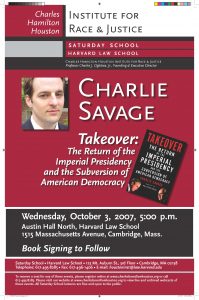Book Signing to Follow
A hidden thread connects many of today’s most important news stories — from warrantless wiretapping and the US attorney firings to torture and the political struggle over the future of the Iraq war. These and other contentious issues in both foreign and domestic policy stem from the Bush administration’s concerted and relentless efforts to increase presidential power. From its first day in office, the administration has been guided by Vice President Dick Cheney’s ambition of permanently strengthening the Oval Office — not just for Bush, but for all future presidents. Charlie Savage of the Boston Globe, who won a 2007 Pulitzer Prize for his reporting on Bush’s unprecedented use of presidential signing statements, has been at the forefront of investigating the myriad ways that the administration has undermined traditional checks and balances on the White House. His reporting has touched off a national conversation about the rule of law and the limits of presidential power. It has been cited in more than 100 editorials and columns in newspapers large and small around the country, prompted a high-profile American Bar Association rebuke of the White House, and launched a debate among legal scholars that continues to this day.
Now, in TAKEOVER: The Return of the Imperial Presidency and the Subversion of American Democracy (Little, Brown and Company; September 5, 2007; $25.99), Savage takes the reader behind the scenes with the administration lawyers who secretly devised ways for presidents to circumvent laws and treaties. He lifts a veil concealing the executive power motivations behind Bush’s picks for the Supreme Court and paints an astonishing portrait of rising executive branch secrecy. Interwoven with this fast-paced, character-driven narrative, Savage provides clear explanations of the Bush team’s radical theories about unchecked executive power and shows how they converted these theories into precedents that all future presidents can cite. TAKEOVER also tells the broader story of presidential power throughout history. After World War II, presidents of both parties exploited the atmosphere of permanent crisis that marked the early Cold War to seize for themselves some of the powers that the Founders intended Congress and the courts to wield. This “imperial presidency” came crashing down after Watergate and the Vietnam War — waning at the very moment that a young Cheney was to have his chance to wield executive power in the White House as President Ford’s chief of staff. Outraged, Cheney joined with a faction of Republicans who abandoned the traditional conservative suspicion of concentrated government power. Beginning in the Reagan years, these “presidentialists” worked steadily to rebuild and expand unchecked White House powers. Today, this hidden agenda three decades in the making has come to fruition, representing the Bush administration’s most successfully implemented policy — one that will reverberate through American democracy for generations to come.
TAKEOVER’s journalistic, fact-based analysis rises above the partisan and policy disputes that divide liberals and conservatives. As a measure of its success in appealing to all Americans, the book is earning rare and extraordinary praise from well-known political thinkers on both sides of the political aisle. Moreover, while the book is written to be understood by lay readers, some of the most prominent legal minds of the day have endorsed it as the definitive account of a critical challenge to the Founders’ constitutional order. Said Harold Hongju Koh, the dean of Yale Law School: “Until Takeover, no one had pieced together in such readable prose the systematic effort at constitutional revolution pressed by the Bush-Cheney administration since September 11.”
When Congress returns this fall and as the 2008 presidential race heats up, TAKEOVER will serve as a perfect guide to understanding that the debates over such issues as executive privilege, surveillance, and proposed legislation to end the Iraq war is also a battle over the future of the Founders’ vision for our country.
About the Author
Charlie Savage covers national legal affairs for the Boston Globe, focusing on 9/11 issues. He graduated from Harvard College and holds a master of studies in law from Yale Law School. He lives in Washington, DC, with his wife and son.


